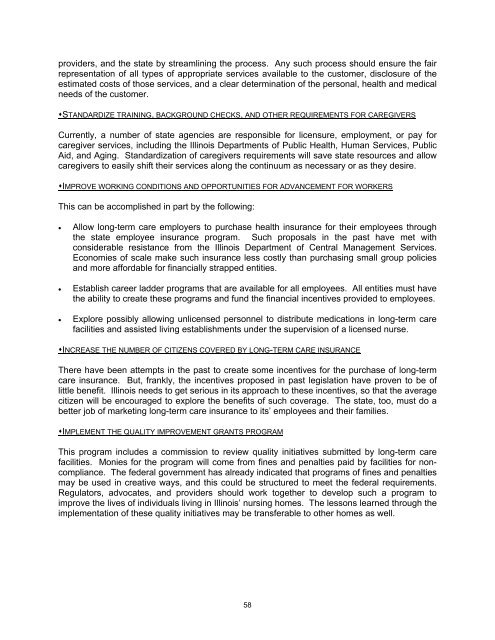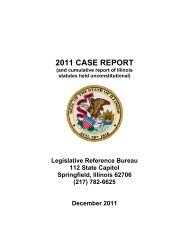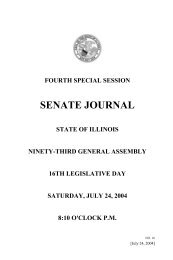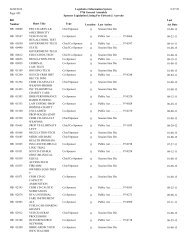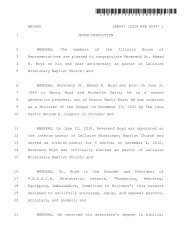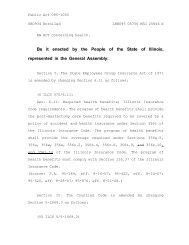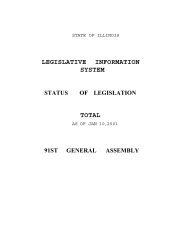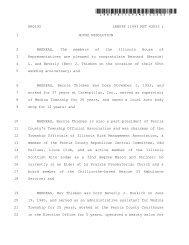Long-Term Care - Illinois General Assembly
Long-Term Care - Illinois General Assembly
Long-Term Care - Illinois General Assembly
You also want an ePaper? Increase the reach of your titles
YUMPU automatically turns print PDFs into web optimized ePapers that Google loves.
providers, and the state by streamlining the process. Any such process should ensure the fair<br />
representation of all types of appropriate services available to the customer, disclosure of the<br />
estimated costs of those services, and a clear determination of the personal, health and medical<br />
needs of the customer.<br />
STANDARDIZE TRAINING, BACKGROUND CHECKS, AND OTHER REQUIREMENTS FOR CAREGIVERS<br />
Currently, a number of state agencies are responsible for licensure, employment, or pay for<br />
caregiver services, including the <strong>Illinois</strong> Departments of Public Health, Human Services, Public<br />
Aid, and Aging. Standardization of caregivers requirements will save state resources and allow<br />
caregivers to easily shift their services along the continuum as necessary or as they desire.<br />
IMPROVE WORKING CONDITIONS AND OPPORTUNITIES FOR ADVANCEMENT FOR WORKERS<br />
This can be accomplished in part by the following:<br />
• Allow long-term care employers to purchase health insurance for their employees through<br />
the state employee insurance program. Such proposals in the past have met with<br />
considerable resistance from the <strong>Illinois</strong> Department of Central Management Services.<br />
Economies of scale make such insurance less costly than purchasing small group policies<br />
and more affordable for financially strapped entities.<br />
• Establish career ladder programs that are available for all employees. All entities must have<br />
the ability to create these programs and fund the financial incentives provided to employees.<br />
• Explore possibly allowing unlicensed personnel to distribute medications in long-term care<br />
facilities and assisted living establishments under the supervision of a licensed nurse.<br />
INCREASE THE NUMBER OF CITIZENS COVERED BY LONG-TERM CARE INSURANCE<br />
There have been attempts in the past to create some incentives for the purchase of long-term<br />
care insurance. But, frankly, the incentives proposed in past legislation have proven to be of<br />
little benefit. <strong>Illinois</strong> needs to get serious in its approach to these incentives, so that the average<br />
citizen will be encouraged to explore the benefits of such coverage. The state, too, must do a<br />
better job of marketing long-term care insurance to its’ employees and their families.<br />
IMPLEMENT THE QUALITY IMPROVEMENT GRANTS PROGRAM<br />
This program includes a commission to review quality initiatives submitted by long-term care<br />
facilities. Monies for the program will come from fines and penalties paid by facilities for noncompliance.<br />
The federal government has already indicated that programs of fines and penalties<br />
may be used in creative ways, and this could be structured to meet the federal requirements.<br />
Regulators, advocates, and providers should work together to develop such a program to<br />
improve the lives of individuals living in <strong>Illinois</strong>’ nursing homes. The lessons learned through the<br />
implementation of these quality initiatives may be transferable to other homes as well.<br />
58


